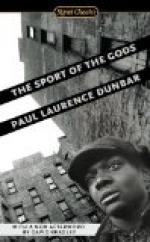“But nowadays everybody thinks stage people respectable up here.”
“Maybe I ’m ol’-fashioned, but I can’t believe in any ooman’s ladyship when she shows herse’f lak dem gals does. Oh, Kit, don’t do it. Ain’t you seen enough? Don’t you know enough already to stay away f’om dese hyeah people? Dey don’t want nothin’ but to pull you down an’ den laugh at you w’en you ’s dragged in de dust.”
“You must n’t feel that away, ma. I ‘m doin’ it to help you.”
“I do’ want no sich help. I ’d ruther starve.”
Kit did not reply, but there was no yielding in her manner.
“Kit,” her mother went on, “dey ‘s somep’n I ain’t nevah tol’ you dat I ‘m goin’ to tell you now. Mistah Gibson ust to come to Mis’ Jones’s lots to see me befo’ we moved hyeah, an’ he ‘s been talkin’ ’bout a good many things to me.” She hesitated. “He say dat I ain’t noways ma’ied to my po’ husban’, dat a pen’tentiary sentence is de same as a divo’ce, an’ if Be’y should live to git out, we ’d have to ma’y ag’in. I would n’t min’ dat, Kit, but he say dat at Be’y’s age dey ain’t much chanst of his livin’ to git out, an’ hyeah I ‘ll live all dis time alone, an’ den have no one to tek keer o’ me w’en I git ol’. He wants me to ma’y him, Kit. Kit, I love yo’ fathah; he ’s my only one. But Joe, he ‘s gone, an’ ef yo go, befo’ Gawd I ’ll tell Tawm Gibson yes.”
The mother looked up to see just what effect her plea would have on her daughter. She hoped that what she said would have the desired result. But the girl turned around from fixing her neck-ribbon before the glass, her face radiant. “Why, it ’ll be splendid. He ‘s such a nice man, an’ race-horse men ’most always have money. Why don’t you marry him, ma? Then I ‘d feel that you was safe an’ settled, an’ that you would n’t be lonesome when the show was out of town.”
“You want me to ma’y him an’ desert yo’ po’ pa?”
“I guess what he says is right, ma. I don’t reckon we ’ll ever see pa again an’ you got to do something. You got to live for yourself now.”
Her mother dropped her head in her hands. “All right,” she said, “I ’ll do it; I ’ll ma’y him. I might as well go de way both my chillen ’s gone. Po’ Be’y, po’ Be’y. Ef you evah do come out, Gawd he’p you to baih what you ’ll fin’.” And Mrs. Hamilton rose and tottered from the room, as if the old age she anticipated had already come upon her.
Kit stood looking after her, fear and grief in her eyes. “Poor ma,” she said, “an’ poor pa. But I know, an’ I know it ’s for the best.”
On the next morning she was up early and practising hard for her interview with the managing star of “Martin’s Blackbirds.”
When she arrived at the theatre, Hattie Sterling met her with frank friendliness.
“I ’m glad you came early, Kitty,” she remarked, “for maybe you can get a chance to talk with Martin before he begins rehearsal and gets all worked up. He ’ll be a little less like a bear then. But even if you don’t see him before then, wait, and don’t get scared if he tries to bluff you. His bark is a good deal worse than his bite.”




